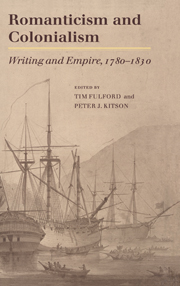Book contents
- Frontmatter
- Contents
- Notes on contributors
- Acknowledgements
- 1 Romanticism and colonialism: texts, contexts, issues
- 2 Romanticism and colonialism: races, places, peoples, 1785–1800
- 3 Romanticism and colonialism: races, places, peoples, 1800–1830
- 4 Accessing India: Orientalism, anti-‘Indianism’ and the rhetoric of Jones and Burke
- 5 ‘Sunshine and Shady Groves’: what Blake's ‘Little Black Boy’ learned from African writers
- 6 Blood Sugar
- 7 ‘Wisely forgetful’: Coleridge and the politics of Pantisocracy
- 8 Darkness visible? Race and representation in Bristol abolitionist poetry, 1770–1810
- 9 Fictional constructions of Liberated Africans: Mary Butt Sherwood
- 10 ‘Wandering through Eblis’; absorption and containment in Romantic exoticism
- 11 The Isle of Devils: The Jamaican journal of M. G. Lewis
- 12 Indian Jugglers: Hazlitt, Romantic Orientalism, and the difference of view
- 13 ‘Some samples of the finest Orientalism’: Byronic Philhellenism and proto-Zionism at the time of the Congress of Vienna
- 14 ‘Once did she hold the gorgeous East in fee…’: Byron's Venice and Oriental Empire
- 15 The plague of imperial desire: Montesquieu, Gibbon, Brougham, and Mary Shelley's The Last Man
- Index
5 - ‘Sunshine and Shady Groves’: what Blake's ‘Little Black Boy’ learned from African writers
Published online by Cambridge University Press: 20 August 2009
- Frontmatter
- Contents
- Notes on contributors
- Acknowledgements
- 1 Romanticism and colonialism: texts, contexts, issues
- 2 Romanticism and colonialism: races, places, peoples, 1785–1800
- 3 Romanticism and colonialism: races, places, peoples, 1800–1830
- 4 Accessing India: Orientalism, anti-‘Indianism’ and the rhetoric of Jones and Burke
- 5 ‘Sunshine and Shady Groves’: what Blake's ‘Little Black Boy’ learned from African writers
- 6 Blood Sugar
- 7 ‘Wisely forgetful’: Coleridge and the politics of Pantisocracy
- 8 Darkness visible? Race and representation in Bristol abolitionist poetry, 1770–1810
- 9 Fictional constructions of Liberated Africans: Mary Butt Sherwood
- 10 ‘Wandering through Eblis’; absorption and containment in Romantic exoticism
- 11 The Isle of Devils: The Jamaican journal of M. G. Lewis
- 12 Indian Jugglers: Hazlitt, Romantic Orientalism, and the difference of view
- 13 ‘Some samples of the finest Orientalism’: Byronic Philhellenism and proto-Zionism at the time of the Congress of Vienna
- 14 ‘Once did she hold the gorgeous East in fee…’: Byron's Venice and Oriental Empire
- 15 The plague of imperial desire: Montesquieu, Gibbon, Brougham, and Mary Shelley's The Last Man
- Index
Summary
At first glance, the poetic diction, heroic verse, and classical allusions characterizing Phillis Wheatley's 1773 Poems on Various Subjects, Religious and Moral would seem to suggest that her poetry has everything to do with neo-classicism and nothing at all to do with Romanticism. Yet a closer examination of Wheatley's collection reveals its significance, not just to the neoclassical tradition from which it derives, nor even to the African–American literary tradition which it initiates, but also, and quite surprisingly, to a particularly problematic poem of the English Romantic tradition. The problematic poem is William Blake's ‘The Little Black Boy,’ and I will argue that reading this Song of Innocence alongside Wheatley's ‘An Hymn to the Morning,’ one of the poems in her 1773 volume, leads to a better understanding of Blake's child speaker and of the intense irony used to portray his situation. Also arising from the juxtaposition of these two poems is the interesting possibility that Blake had some familiarity with Wheatley's work in particular, and with eighteenth-century England's small but notable African literary community in general.
In the eighteenth century, as Henry Louis Gates, Jr. tells us, a tradition of African writing in England was born in ‘response to allegations of its absence’, allegations which had been made by European writers such as Hume, Kant, and Hegel (among others), and which had led to ‘metaphors of the childlike nature of the slaves’, and ‘of the masked, puppetlike personality of the black’.
- Type
- Chapter
- Information
- Romanticism and ColonialismWriting and Empire, 1780–1830, pp. 67 - 86Publisher: Cambridge University PressPrint publication year: 1998
- 1
- Cited by



